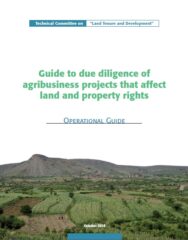
The recent surge in large-scale land acquisitions has prompted the international community to launch several initiatives to deal with this phenomenon. So far, the greatest progress has been made in 2012 with the endorsement by the Committee on World Food Security (CFS) of the Voluntary Guidelines on the Responsible Governance of Land, Fisheries and Forests in the Context of National Food Security. The Principles for Responsible Investment in Agriculture and Food Systems, recently adopted, improve the voluntary guidelines and raise the issue at stake for the French Cooperation. The objective is to ensure that these principles are practicable and respected in all activities supported by French institutions. This publication draws on the work undertaken by members of the ‘Land Tenure and Development’ Technical Committee set up by AFD and MAE. It presents an Analytical Framework and a Guide that each institution can now appropriate and use to change their internal project evaluation procedures.
The holistic approach used to develop these tools looks beyond the land tenure aspects of projects. It also considers their social, economic and environmental dimensions, allowing potential donors to focus on matters that are sometimes overlooked, examine the economic considerations, analyse how the added value generated by a project is distributed between actors and fully factor in social and environmental considerations. This contextualised analysis takes account of the overall land governance framework and dynamics of change in agrarian systems, using a historical approach to better understand the current situation. As such, it represents an important step to promote evolution in the standards currently used by international cooperation agencies. These tools also use a dynamic approach that places particular emphasis on contractual arrangements for investment projects and on the processes through which those arrangements are developed. In this context, transparency is framed not simply as a matter of publishing contracts, but as something to be taken into account throughout the whole process – from publishing environmental and social impact assessments to consulting local populations and conducting and concluding the final negotiations.
The challenge for the French Cooperation was being able to translate very general texts into practical tools. This work is now being taken forward within the AFD Group, and feeding into reflection by other technical and financial partners and groups of actors involved in negotiating or monitoring agribusiness projects that affect land holdings. In doing so, the French Cooperation is helping promote and facilitate more transparent governance of land tenure.

Rejoignez-nous sur
LinkedIn